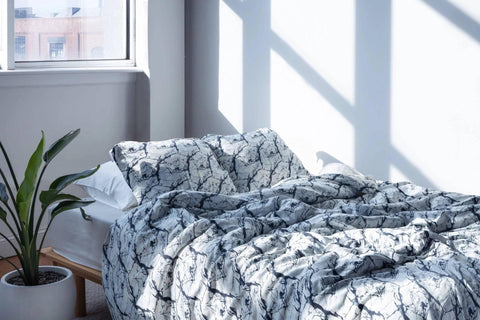Embracing eco-friendly choices in our daily lives is not just a trend; it's a crucial step towards a sustainable future. This is particularly significant for college students, who are preparing for their futures and have the opportunity to champion environmental responsibility. As part of this journey, selecting eco-friendly dorm bedding becomes a powerful statement. It's about choosing products that comfort and beautify and reflect a commitment to protecting our planet.
Eco-friendly dorm bedding is a testament to the idea that small changes can make a big difference. By opting for bedding made with sustainable materials and ethical practices, students can contribute to a healthier planet, all while enjoying the cozy embrace of their dorm room. This choice embodies the intersection of style, comfort, and sustainability, proving that living an eco-conscious life doesn't mean compromising on quality or aesthetics. It's a simple yet profound way for students to integrate sustainability into their daily lives, laying the foundation for a lifetime of eco-conscious decisions.
The Rise of Eco-Friendly Dorm Living
The rise of eco-friendly dorm living reflects a broader shift toward environmental consciousness among college students, a demographic keenly aware of sustainability's role in shaping a healthier planet. This trend is characterized by a growing preference for products that minimize environmental impact, from reusable water bottles to eco-friendly dorm bedding. The emphasis on sustainable living practices among young adults highlights a commitment to not just talk about change but to enact it in their daily lives, fostering a culture of responsibility and awareness that extends beyond campus borders.

Not Labeled emerges as a vital player in this movement, demonstrating a profound commitment to offering sustainable bedding options. By curating a collection of eco-friendly dorm bedding, Not Labeled meets the demand for sustainable products and champions the ethos of environmental stewardship. Their range of bedding options, crafted from materials like organic bamboo, underscores a dedication to reducing ecological footprints and promoting ethical consumption. For students, choosing Not Labeled's eco-friendly bedding is a step towards embodying the principles of sustainability in their personal space, making a statement that extends well beyond aesthetic appeal to reflect deeper values of care for the environment.
Understanding Eco-Friendly Bedding Materials
Understanding what makes bedding eco-friendly delves into both the materials used and the processes involved in its creation. At the heart of eco-friendly bedding are organic materials like bamboo and organic cotton, celebrated for their natural, renewable qualities and minimal environmental footprint. Bamboo, for example, grows rapidly and doesn't require pesticides, making it an inherently sustainable choice. Organic cotton similarly benefits the environment by eschewing the chemical treatments found in conventional cotton, ensuring a cleaner, greener production cycle.
Sustainable production processes are equally vital, encompassing everything from the reduction of water usage to the implementation of fair labor practices. Not Labeled takes pride in utilizing these eco-conscious materials and methods, offering bedding that supports both the planet and its people. Their commitment extends beyond the materials to include every aspect of production, ensuring that each step, from harvesting to manufacturing, adheres to the highest environmental and ethical responsibility standards. This comprehensive approach to sustainability not only minimizes the impact on the earth but also provides consumers with healthier, more natural bedding options.
Incorporating eco-friendly materials, Not Labeled exemplifies how sustainable practices can be integrated into everyday products, offering consumers a way to make responsible choices without compromising on quality or comfort.
Visit NotLabeled Bedding for more details on our eco-friendly bedding options.
Top Picks for Eco-Friendly Dorm Bedding from Not Labeled

Not Labeled offers an impressive range of eco-friendly dorm bedding options that elegantly blend style with sustainability. Their collection includes sheet sets made from organic materials, providing not only comfort but also peace of mind knowing they're produced in an environmentally responsible manner. Additionally, Not Labeled's duvet inserts are crafted with eco-conscious materials, ensuring warmth, comfort, and breathability, ideal for any dorm room setting.
Our unique throw pillows add a splash of personality and style to dorm rooms. They are made with sustainable fabrics and fillings, highlighting Not Labeled's commitment to eco-friendly production practices. These options demonstrate that choosing sustainable bedding does not mean compromising on design or comfort, allowing students to create a space that reflects their values and style. For more details on our eco-friendly dorm bedding options, including sheet sets and unique throw pillows, visit Not Labeled's Bedding Collection.
Benefits Beyond the Environment
Eco-friendly dorm bedding brings with it numerous benefits beyond its positive impact on the environment. The use of natural and organic materials in these bedding options often leads to a significant improvement in sleep quality. These materials allow the skin to breathe more easily, regulate body temperature effectively during sleep, and offer superior comfort. Additionally, eco-friendly bedding is typically hypoallergenic, reducing the occurrence of allergic reactions and skin irritation, which can be a concern with synthetic materials.
Moreover, the durability of eco-friendly materials means bedding lasts longer, leading to cost savings over time. This longevity reduces the need for frequent replacements, offering a smart financial decision for budget-conscious students. Ultimately, choosing eco-friendly dorm bedding is not just a step towards a more sustainable lifestyle but also enhances personal health and well-being, proving to be beneficial in more ways than one.
 Skip to content
Skip to content


